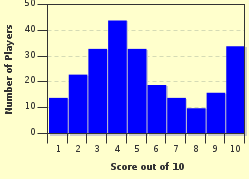Quiz Answer Key and Fun Facts
1. In the 3rd century BC the island of Sicily was a powder keg waiting for a match. The western half was controlled by the north African superpower, Carthage, the eastern half consisted of a number of Greek colonies, the largest of which was Syracuse. To the north the Roman republic had conqured southern Italy and now coveted Sicily. Which event acted as the trigger for the war?
2. With Rome and Carthage at war over Messina, the Syracusans were faced with the difficult choice of whom to support, Carthage (better the devil you know?) or Rome (a potential friend?). What did they do?
3. Syracuse was ruled by a monarchy, its current king was Heiro, but what system of government did Rome and Carthage share?
4. Initially the Romans had great success and pushed the Carthaginians back into the western part of the island, however they lost their momentum and the Carthaginians began to recover. With the war in Sicily in deadlock, the Romans attempted an invasion of Africa to threaten Carthage itself. Who commanded this expedition?
5. At which battle was the result of the African campaign decided?
6. At the beginning of the war Rome was already the leading naval power in the Mediterranean.
7. What "secret weapon" helped the Romans to dominate the naval war?
8. In 249BC the war turned decisively in favour of the Carthaginians, they won a decisive naval victory at Drepana and then landed an army in Sicily under the command of Hamilcar Barca. What happened next?
9. How did the Romans raise the money for a new fleet?
10. Where was the decisive battle of the war?
Source: Author
bobalmighty
This quiz was reviewed by FunTrivia editor
bloomsby before going online.
Any errors found in FunTrivia content are routinely corrected through our feedback system.

